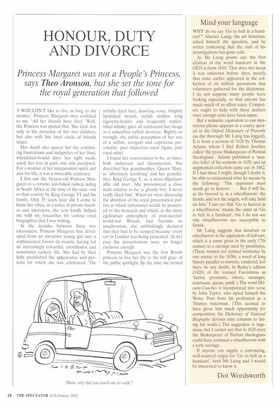Mind your language
WHY do we say `Go to hell in a handcart'? Alastair Laing, the art historian, asked himself the question, and he writes confessing that the trail of his investigations has gone cold.
As Mr Laing points out, the first citation of the word handcart in the OED is from 1810. That does not mean it was unknown before then, merely that none earlier appeared in the collection of six million quotations that volunteers gathered for the dictionary.
do not suppose many people were looking especially, or that anyone has made much of an effort since. Computers ought to help with these matters once enough texts have been input.
But a semantic equivalent to our mysterious phrase appears in a source quoted in the Oxford Dictionary of Proverbs (as the thorough Mr Laing has logged). It is from a sermon of 1626 by Thomas Adams, whom I find Robert Southey called 'the prose Shakespeare of Puritan theologians'. Adams published a 'massive folio' of his sermons in 1629, and an augmented collection came out in 1862. If I had these I might, though I doubt it, be able to understand what he means by the following: 'This oppressor must needs go to heaven. . . But it will be, as the byword is, in a wheelbarrow: the fiends, and not the angels, will take hold on him.' I can see that 'Go to heaven in a wheelbarrow' means the same as 'Go to hell in a handcart', but I do not see why wheelbarrows are susceptible to fiends.
Mr Laing suggests that handcart or wheelbarrow is the equivalent of hell-cart, which is a name given in the early 17th century to a carriage used by prostitutes. (These women are termed metitoriae by one source in the 1630s, a word of long history parallel to meretrix, rendered, lest there be any doubt, in Bailey's edition (1828) of the learned Facciolatus as 'harlot, prostitute, whore, strumpet, courtesan, quean, punk'.) The word He!carte-Coaches is incorporated into verse by John Taylor, who styled himself the Water Poet from his profession as a Thames Waterman. (This seemed to have given him much opportunity for composition; the Dictionary of National Biography devotes nine columns to listing his works.) The suggestion is ingenious, but I cannot see that in 1626 even the Shakespeare of Puritan theologians could have confused a wheelbarrow with a tarty carriage.
If anyone can supply a convincing, well-sourced origin for 'Go to hell in a handcart', both Mr Laing and I would be interested to know it.
Dot Wordsworth




































































 Previous page
Previous page